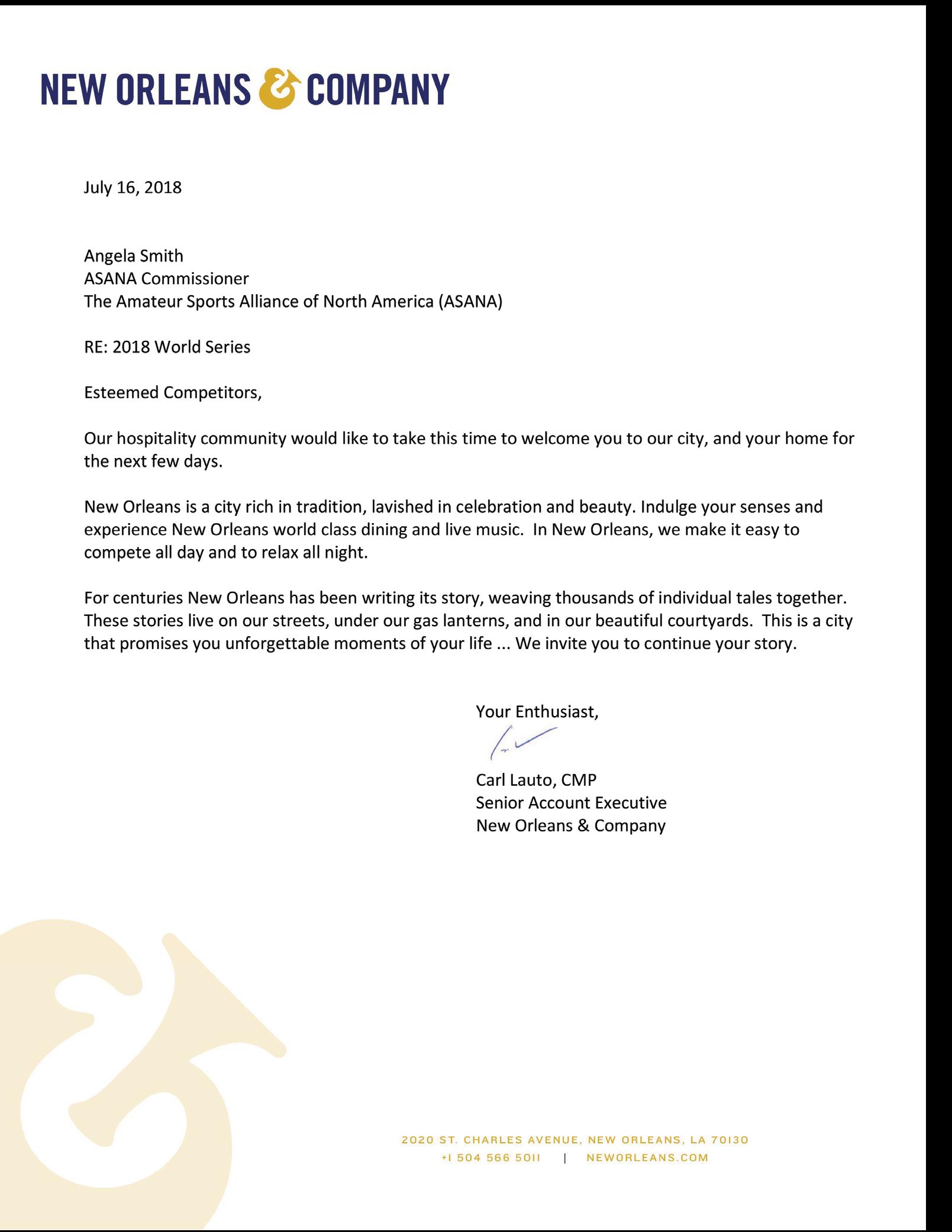
10 minute read
EVENTS
event information & schedule

Advertisement
Each year ASANA partners with a host city to deliver the ASANA Softball World Series, one of the largest annual all-female sporting events in the world. Over 1,500 athletes, coaches and fans from 25 member-cities across North America travel to compete and celebrate equality … one game at a time.
This year the 2018 ASANA World Series is celebrating its 11th anniversary in New Orleans – what a place to celebrate!
Sunday, September 16 12:30 p.m.
ASANA Swamp Tour, Jean Lafitte National Historical Park/Preserve
Monday, September 17 9:00 a.m.-5:00 p.m. 5:00 p.m.-7:30 p.m. Summer Council Meeting, Omni Riverfront ASANA Delegates & Friends Happy Hour, Coyote Ugly
Tuesday, September 18 Noon-3:00 p.m. 4:00 p.m.-5:00 p.m. 5:00 p.m.-6:00 p.m. 6:00 p.m.-10:00 p.m. Bat Check, Omni Riverfront Managers Meeting, Omni Riverfront Umpires Meeting, Omni Riverfront Opening Party & Player Registration, Mardi Gras World
Wednesday September 19 • Pool play begins, Val Reiss Park • Bat Check, Val Reiss Park • Player Registration, Val Reiss Park 7:00 p.m. Hall of Fame Dinner, Riverview Room
Thursday September 20 • Pool play continues, Val Reiss Park • Player Registration, Val Reiss Park • Bracket play begins, Val Reiss Park
Friday, September 21 • Bracket play, Val Reiss Park • Player Registration, Val Reiss Park
Saturday, September 22 • Championship Play, Val Reiss Park • 2nd Annual ASANA / Lynn Lewis Foundation Flag Football Invitational • Closing Party, Fulton Alley
Sunday, September 23 • 2nd Annual ASANA / Lynn Lewis Foundation Flag Football Invitational
NOTES 1. Pool play will run Wednesday - Thursday. Bracket play begins on Thursday and runs through Friday.
Saturday is championship day and 1st - 3rd place will be awarded.
2. All players must register in person prior to playing in their first game. Registration will be available at the
Opening Party and at Val Reiss Park.

ID Checks - In addition to championship 3. game ID checks, ASANA may randomly check IDs for players throughout the series for any reason or for no reason. Please make sure your team has their IDs with them for all games.

L-R AJ, RACHEL, VICTORIA, KARA
Sports diversity
In action! By Connie Wardman S ports diversity is all about inclusion, diversity, accessibility and equality. Some people talk a good game when it comes to including the LGBTQ community or those of a different race or ethnic background on their teams. But when it comes to an athlete with a disability they sometimes assume that that athlete can’t help their team win. Thank goodness the Quit Your Pitching softball team knows better!
Meet Kara Gulvas, Alicia “AJ” Johnson, Victoria Rainey and Rachel Sweigart, all enthusiastic athletes who don’t believe their Deafness is a disability or that it can prevent them from playing winning softball … or doing anything else they put their minds to!
Quit Your Pitching is the clever name of one of the teams participating in this year’s ASANA World Series. In spite of a team name change, Quit Your Pitching has had Deaf players for the last two years. Their team is part of CAPS, the LGBTQ and ally-friendly Chesapeake & Potomac Softball League that draws players from the greater Washington/Baltimore metropolitan area.
In addition to all playing for Quit Your Pitching, Kara, AJ, Victoria and Rachel have other similarities. They’ve all attended Gallaudet University for the Deaf and Hard of Hearing in

Washington D.C. and played a wide There is a way to overcome that and it variety of sports. They’ve also settled is by trying. Start somewhere. We 'hear' in the Washington, D.C. and Northern this often (pun intended), that they Virginia area, are in their mid-to-late want to learn ASL. Now the question 20s and all four are “taken” in terms of is, what’s really stopping them from a personal relationship. learning this beautiful language?"
Don't be confused by the different Due to limited space, here are just shirts they wear - they all play on a few questions I asked each of these additional softball teams and leagues, Wonder Women. When you read including the National Softball their answers, I’m sure you’ll be as Association of the Deaf (NSAD). impressed by them as I am. Just maybe But their passion for playing sports you’ll not only expand your vision of doesn’t stop at softball. All told, what sports diversity really is but also the list includes tackle football, flag sign up to learn ALS! football, basketball, soccer, track & field, volleyball, cheerleading, golf, Compete: Does your team have a cornhole, even funambulism (tight hearing player fluent in sign language? rope walking)! And if you don’t have an interpreter
What has impressed me most about on the team, what do you do when these women is their passion for living you play away games, like the ASANA and enjoying a full productive life. For World Series in New Orleans? those who may think that being Deaf is a disability, you only have to read what AJ: We don’t have any hearing they’ve had to “say” about being Deaf players who know and about their ability to play softball. sign language Their only request to me was to on our team correct any spelling or grammar errors [Quit Your because, as they reminded me, English Pitching]. isn’t their first language – it’s American We don’t Sign Language (ASL). need an
Learning ASL is perhaps one of the interpreter best things hearing athletes can do to improve the feeling of inclusion on a team. Here’s what Victoria has to say about it: "As a Deaf person and a Deaf athlete, it’s important to be included in everything.
Exclusivity is a common problem among the Deaf community. We are often Rachel pushed aside because of the communication barrier that can easily be solved … if they just learned our language.

"I love sports because it gives me hope. It gives me reasons to be better. Over the years sports have taught me that hard work pays off, physically and mentally. I learned how to be confident and if I wasn’t, how to change that. I could go on and on how sports benefit me, but the main reason why I love sports is because it has shaped me into the woman I am today."
Victoria
to play the game we know and love. But we would prefer to have an interpreter for hearing people doing presentations, events, coaches talking or other people asking something. For New Orleans, I’m going there to play softball and maybe educate others [about Deaf players] but then I’m there to have fun as well as everyone else.
Compete: As a Deaf person, how are you able to play a team sport? What do you need as a player and how is the team able to interact with you in a fast-moving sport like softball?
Rachel: To me, I have never really considered my Deafness as a barrier in sports. The game is the same regardless of who plays it. However, I love playing with my Deaf community since it does add more conversation and comfort to the game. For my hearing leagues, we discuss signs or gestures prior to the games to be able to communicate on the field.
AJ: I am an athlete; I have been playing sports my whole life and I’m a fast learner. Sports are invented mostly by gestures. If I’m going to play with hearing people who don’t know sign language, we will use gestures in softball language. If the team knows how to interact with me in sports they can just be themselves and work with me.
But usually when they’ve never met a Deaf person, they will avoid us or act weird since they don’t know how to react or respond. Honestly, Americans are usually the only people who don’t know how to gesture with others and then panic. You’ve just got to be yourself and try your best to learn how to work with others. We Deaf people have been working with hearing people our whole lives. Hearing people just need to learn to be themselves, interact and learn from there.
Kara: Each team has its own dynamics and I would adjust to the
team and the team would have to adjust to playing with me. We would learn each other’s weakness and strengths. Also, I apply my knowledge to the game and play.
Victoria: As a Deaf person, I can play a team sport like everyone else. The only difference between the “hearing” players and Deaf players is our form of communication. I use my hands – they use their voices. Deaf people usually communicate using their hands and sometimes, both. It might be perceived as a barrier to others but it’s not always the case. If everyone knows the rules, everything can fall into place. It might not be the easiest thing to accomplish but it’s possible to establish some sort of communication before playing. It helps if you build some sort of connection with the people on your team and the people officiating your team.
Compete: Why do you love sports?
Victoria: That’s almost like asking us why we breathe. I love sports because it gives me hope. It gives me reasons to be better. Over the years sports have taught me that hard work pays off, physically and mentally. I learned how to be confident and if I wasn’t, how to change that. I could go on and on how sports benefit me, but the main reason why I love sports is because it has shaped me into the woman I am today.
AJ: Sports are my life! It is one of the reasons that keep me going. I play for the Love of the Game!

AJ

Kara

Kara: I love sports because of two things; the camaraderie of being on a team and it keeps me busy.
Rachel: I am a small-town girl who didn’t have much else to do growing up. It’s always felt like therapy for me and I always have such a blast playing.
Compete: What would you like to tell your younger self or perhaps say to younger Deaf athletes looking up to you as a role model? to tell my younger self something, I would say this: 'Have courage, know that you’re worthy of great things, give back, be grateful, value relationships over things, stop comparing yourself to others and most importantly, love yourself.'
Rachel: If I could go back and tell my younger self something, I think I would say don’t be so hard on yourself, let go of the little things and always stand up for what you believe in no matter how difficult it may seem at the moment. I want the younger generation to learn to always treat others with respect and if you see someone struggle, help them rather than watch. Be the best you can be.
AJ: For the younger Deaf generation, if you want to play the sport you love, fight for it and commit to it. Do not degrade yourself to others and become lazy and cocky. Stay humble, support each other and don’t go against
Kara: If I was given the chance each other.
Victoria: If I was able to teach the younger generation, especially younger Deaf individuals who may be looking up to me, I would say: 'Try. Don’t sell yourself short and don’t think the worst before trying. If you fail, try again. You miss all the opportunities you don’t
take.'
Thank you, AJ, Kara, Rachel and Victoria for taking part in this interview. Now go to New Orleans and show the hearing athletes that the Deaf athletes definitely know how to “Play Ball!”









